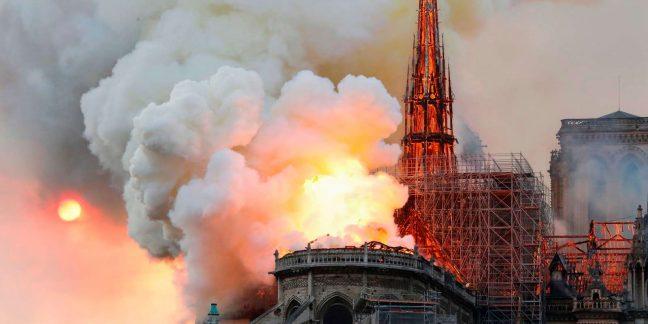April 2019 has become the month of fire. Around the world, holy sites have burned, some intentionally through hate crimes, others, through hopeless accidents.
Much of the world collectively sat in horror April 15 as news spread that the 800 year old, legendary cathedral Notre Dame went up in flames.
In real time, social media itself was ablaze in shock as the pillar of Notre Dame burned, before cracking in two and falling to the ground. The fire was entirely an accident.
People across the U.S. sprang into action, posting photos of themselves at or next to Notre Dame — a not-so-subtle flex that they’ve been to Paris — eulogizing, reminiscing and proudly hopeful of the beautiful cathedral’s return to splendor.
It’s always been ‘this bad’: White supremacy blinds white people from recognizing racial injustice
President Emmanuel Macron of France promised that Notre Dame would be rebuilt within the next 5 years — a bold goal which he believed could be done with the help of the international community. Almost instantly, billionaires rushed to support the cause, as did President Donald Trump on behalf of the U.S., despite the fact that this country still has not offered support to Puerto Rico or Flint, Michigan, — which are actually part of the U.S.
That same day, about 2,000 miles away, a two millennia old holy site that houses the Al-Aqsa mosque burned in Jerusalem, the third holiest site in Islam. The mosque has a history that traces back well over 1,000 years. But while worldwide media attention was fixated on Paris, hardly any American stories gave any attention to this fire.
Between March 26 and April 4, three historically black churches in Louisiana were burned down, a case that is currently being tried as a hate crime. Rightfully, the story received national attention, but it didn’t receive nearly the same sorrow as Notre Dame, and it certainly didn’t get the dozens-of-deep-essays-on-the-importance-of-religious-sites treatment that many media organizations gave to the cathedral in Paris.
This is a problem that transcends money funding — it’s about the nearly ubiquitous mourning for one loss, and then passive lamentation at best by the public for others.
For institutions representative of white communities, such as a Catholic church, intentionally or not, there is universal outpouring sadness and deep reflective contemplation on big concepts such as “history” and“ culture.” But when tragedies strike communities of color or non-Christian communities, the out-cry or concerns don’t seem to have the same gravity or ubiquity.
Interfaith dialogue, religious literacy are driving forces fueling campus-wide activism
The fire in Jerusalem received hardly any media attention. According to tradition and belief, the Al Aqsa mosque is the site where the prophet Muhammad prayed during his night journey. That is to say that to Muslims and the rest of humanity, it’s an important and vital holy site, that carries the same significance to the world as, say, Notre Dame.
And in Louisiana, historically black churches carry as much history and culture as anything else, but eulogizing and agony didn’t weep from social media with the same voracity that the Notre Dame burning did.
Vann Newkirk II, a staff writer at the Atlantic summed this hypocrisy up well on Twitter.
“I don’t know if people realize how much hard history — the records black communities could not store anywhere else — is lost when those places are destroyed,” Newkirk said. “If nothing else, ancient buildings are testaments to human endurance beyond individual lives. But that applies too for black churches, erected as enduring monuments of defiance and the only places in some cases where history survives.”
These Black churches carry more than just the weight of religion — they carry community, history, culture and pride. But where universal sorrow followed the Notre Dame fire, the destruction of these was met with a lot less noise.
Religious observance should not be inconvenience for non-Christian students
But in society’s eyes — and the media’s too — they’re not held as the same importance. To the communities harmed by the hatred of one individual, these churches represent their lives and their intensities. There’s a fundamental lack of caring, intentionally or not towards these spaces that somehow, wrongly, seem of less importance than Notre Dame.
Notre Dame is only “more important” because that’s how the conversation and institutional and centuries-long power-dynamics have been molded. By focusing on Notre Dame and not these churches in the south, we literally are just continuing to uphold and protect these white power dynamics.
Shortly after the Notre Dame fire, many took to Twitter to implore recognition of the churches in Louisiana. This outcry has resulted in an outpouring of monetary support for the Louisiana churches and their efforts to rebuild. This is a wonderful and important step. But it doesn’t change the disparity in reactions between an accident and a hate crime.
The cycles and effects of colonialism can be understood through the lens of what gets fixed and what doesn’t. The churches in Louisiana and the mosque in Jerusalem won’t receive promises from billionaires, who could easily fund their reconstruction. Billionaires will not jump at the chance to give Flint clean water or rebuild Puerto Rico. But Notre Dame will almost certainly be rebuilt with gusto and urgency.
Adam Ramer ([email protected]) is a senior majoring in political science and history.





















